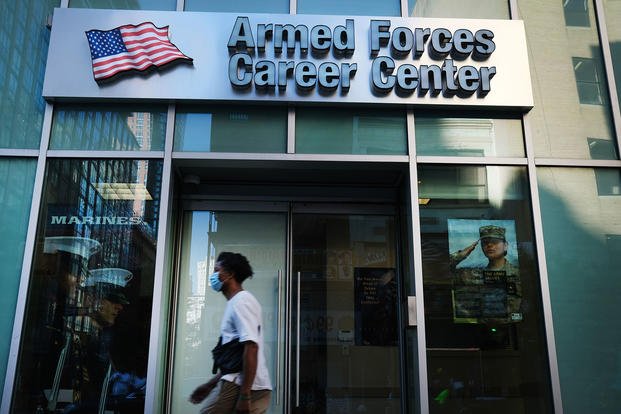The opinions expressed in this op-ed are those of the author and do not necessarily reflect the views of Military.com. If you would like to submit your own commentary, please send your article to opinions@military.com for consideration.
At a recent House Armed Services Committee hearing, leaders from the Army, Navy, and Air Force all dutifully reported that they expected to miss their annual recruiting goal this year by thousands. This is just the latest sign that the military recruiting crisis—the worst since the institution of the all-volunteer force in 1973—is not abating.
Despite significant efforts by the military services, such as offering hefty enlistment bonuses of up to $50,000 and the ability to choose your first duty station, recruiting numbers have not improved. The effects on the armed forces are sobering: Navy ships are undermanned, and the Army is considering cutting the number of its Brigade Combat Teams.
Assemble 100 experts and veterans in a room and you will hear 100 reasons why recruiting is in trouble. At least one will point to low unemployment and the competitive job market; others will blame the lack of eligible recruits, disqualified by obesity or low test scores. Still more will mention the lack of knowledge among youth of military life and benefits, fear of death or injury, lack of patriotism, concerns about “wokeness,” and fallout from the disastrous Afghanistan withdrawal. Others will cite the differences between young people in Generation Z, who are currently the prime age for recruiting, and prior generations.
Who is right? Well, all of them. Each of these issues contribute to the military’s inability to recruit. Fixing just one will not right this ship. Only a comprehensive approach will work.
Recruiting has always been known as a tough duty among military members. Even though there are roughly 30 million Americans aged 18-24 and the military only needs about 160,000 of them per year to meet its goals, it has never been easy to convince young people to sign up for service. But since 2018 when a strong U.S. economy and a hot job market increased competition, recruiters have been really struggling. Now, in the face of the headwinds described above, they are failing.
Unfortunately, it is not clear that our national leaders even understand there is a problem. Although some service secretaries, such as Secretary of the Army Christine Wormuth, and four-star generals have been sounding the alarm, they cannot do it alone. Without broad support from the White House, senior DOD leaders, and other federal departments, recruiting numbers will continue to founder.
A call to action is needed to increase public awareness about the severity of the situation. Most Americans remain blissfully unaware that their military is literally shrinking by the day.
This is largely because the public possesses an overall positive perception of the armed forces, despite the fact that the military remains detached from the lives of most Americans. To solve the recruiting crisis, it is essential to bridge this gap between the military and the American people. Every significant concern that the American public has about military service must be addressed head on.
Recruiting messages, for example, must highlight the importance of service as well as appeal to the interests and taking on the concerns of young people. That means crafting a response to young Americans worried that military service will result in mental and physical trauma. The military is not risk-free, of course, but most veterans leave stronger and healthier than when they entered, not riddled with mental scars and physical injuries.
The same approach must be applied to the package of pay and benefits that the military offers. The armed forces may not be able to fully match the private sector in this regard, but it must at least be on the same playing field.
Finally, perhaps the most important action that our leaders can take is to educate young Americans on the necessity of a strong military and the positive impact of military service, both for oneself and for the nation. For example, contrary to popular belief, the military is not an impediment to higher education and career opportunities. Quite the opposite, it provides an opportunity for social mobility, and the GI Bill allows veterans to pursue university studies without incurring crushing student debt. Many come away from service with leadership skills and self-discipline that the private sector greatly values.
It is too easy to label Generation Z as unpatriotic, unmotivated or incapable. What is needed is action.
Critics should keep in mind that the recruiting crisis has not been caused by just one problem, and it won’t be fixed with just one solution. Indeed, it will require the effort of an entire nation. Government and military leaders, parents, teachers and community role models will all have to engage with young people to help them understand the importance of military service and how their lives can be directly connected to that great purpose.
There can be no more excuses or delays. The time to act is now.
____
ABOUT THE WRITER
Thomas Spoehr, a retired U.S. Army lieutenant general, is director of The Heritage Foundation’s Center for National Defense.
___
©2023 Tribune Content Agency, LLC.
© Copyright 2023 The Heritage Foundation.
Please rate this CIBA article
Vote






